Maths Tuition
Personalised Maths Tuition Achieves Double Expected Progress For 8 to 16 Year Olds
In a class of 30, it can be hard to give pupils the individualised support they need, meaning pupils can fall behind.
Maths tuition supports whole class teaching by providing pupils with individualised support in the areas they need it most.
Third Space Learning uses initial and ongoing diagnostic assessment to deliver a completely personalised curriculum that pupils work through one to one and at their own pace.
In a trial using PUMA standardised assessments, students made double progress – 28 weeks progress over 14 weeks.
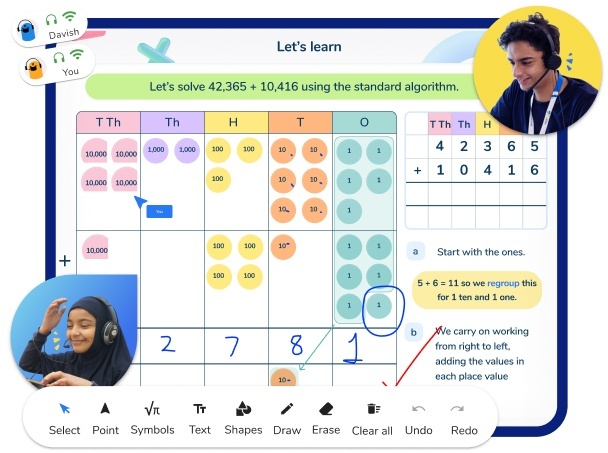
“Third Space Learning provides individualised support targeted at gaps in learning and gives the children valuable input into their learning that sometimes they don’t get in the busy day at school. It has boosted children’s confidence in maths and promotes maths language and reasoning.”
Assistant Headteacher
Blackpool
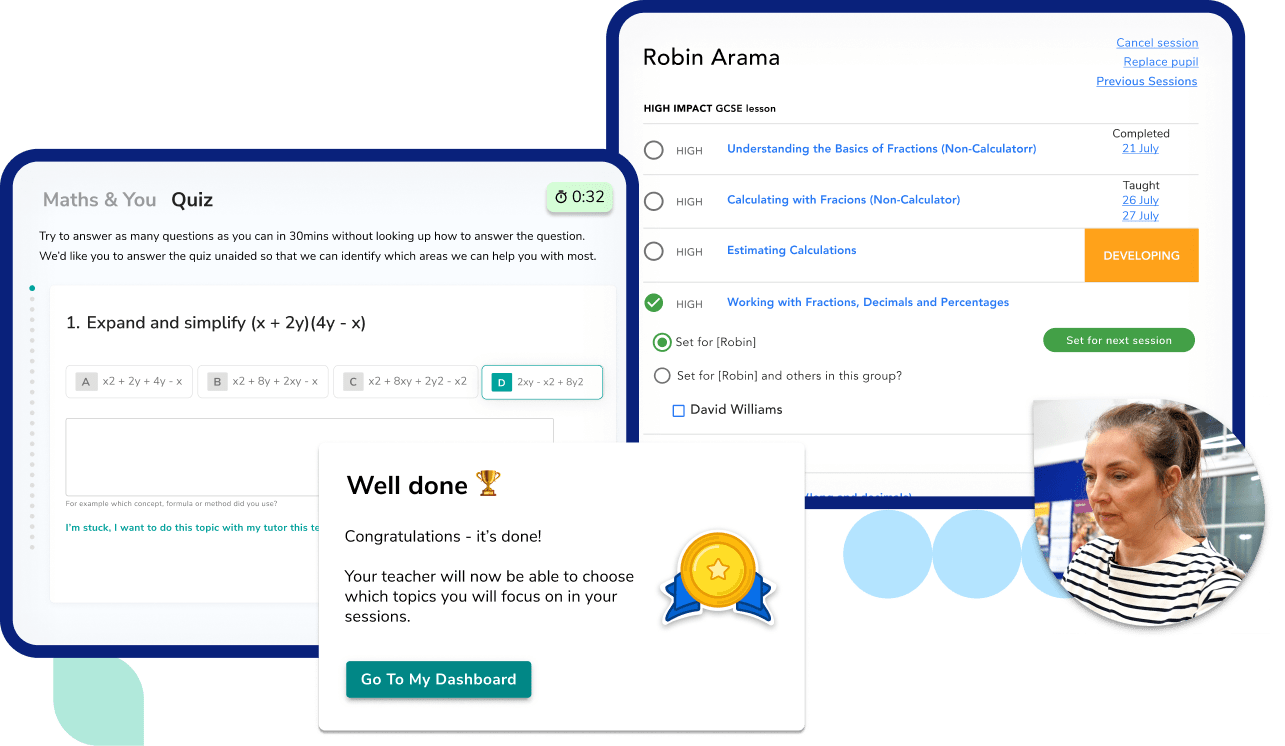
Personalised one to one teaching
Every student deserves individualised attention. Our diagnostic assessment informs each pupils’ personalised programme of learning objectives that they will work through with their expert maths tutors in a safe, supportive one to one learning environment.

Online maths specialists
Our maths lessons are designed by qualified maths teachers with several years’ teaching experience in UK schools, informed by the latest learning methodologies and delivered by maths specialist tutors.
By tapping into the global market, we are able to recruit and train qualified tutors with enthusiasm for and experience in education.
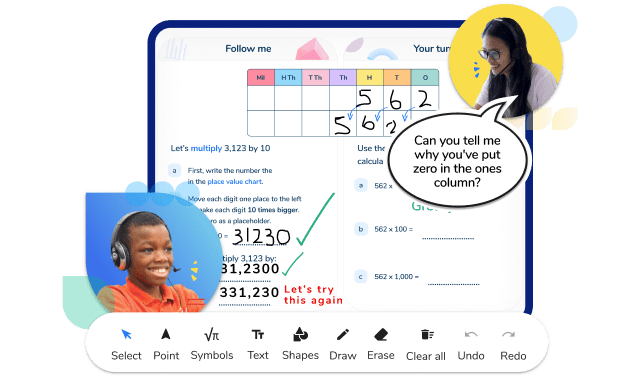
Flexible and designed for schools
We have over 10 years of experience working with almost 4,000 primary schools and secondary schools in the UK. Our programme is designed to fit into the busy school day without adding to teacher workload.
We have flexible timings for our online lessons and each school is allocated a friendly account manager to help with everything from initial set up to session troubleshooting.
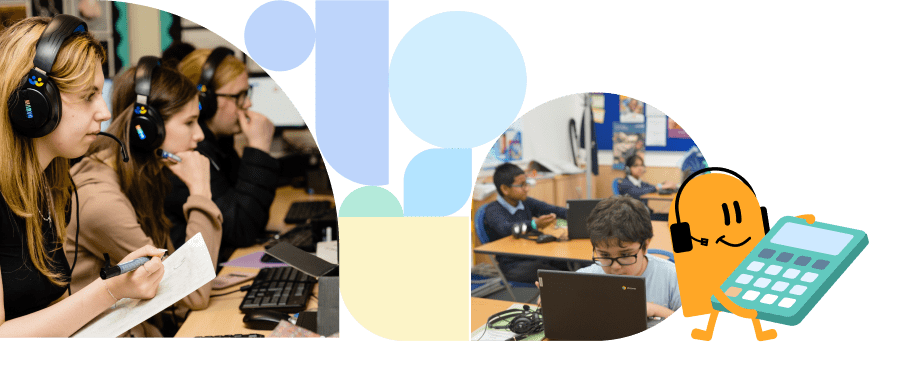
Affordable one to one tuition
Private maths tutors, especially one to one and face to face, have been traditionally unaffordable for many individuals and schools. However, the National Tutoring Programme now means schools have additional funding for maths tuition.
Third Space Learning is the most DfE-approved one to one tuition provider.
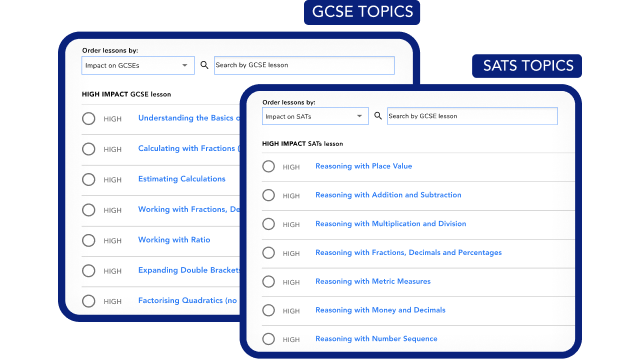
Supports exam success
We have a range of programmes designed by qualified teachers to boost pupil progress at every stage of their learning journey, including targeted exam programmes for pupils preparing for SATs and GCSE exams. We do not currently have programmes for iGCSE, A-level mathematics or further mathematics.
Our SATs programme prioritises lessons based on their likely impact on pupils’ SATs scores and provides key stage 2 pupils with plenty of practice with SATs-style numeracy questions.
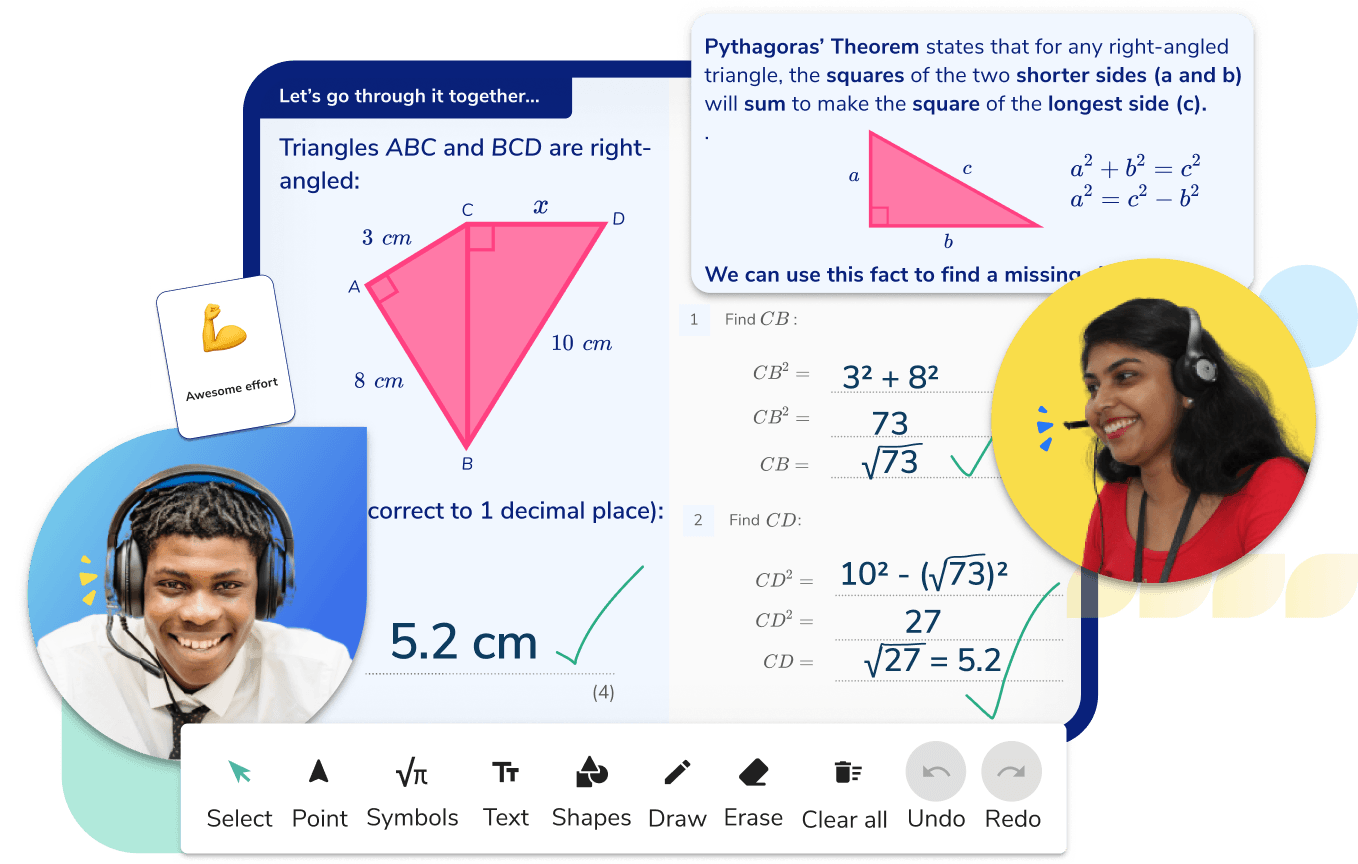
GCSE Maths tuition
In our Maths GCSE programme, we support pupils to develop from guided to independent practice and focus on exam technique. Our tutors have experience preparing pupils for all exam boards, including AQA, Edexcel and OCR (Oxford Cambridge and RSA).
How maths tuition with Third Space Learning works
1. Select the programme: We provide different online tuition programmes to provide support to learners at different stages. Whether you need a targeted intervention for GCSE level maths or SATs preparation or general support from times tables to ratios for your KS1- KS3 pupils, Third Space Learning can help.
2. Choose your pupils: You choose which pupils will benefit most from individualised, one to one support. You have the flexibility to swap pupils in and out.
3. Choose your regular time slot: Our sessions run throughout the school day so you can choose a regular time slot that works best for your school, with the flexibility to cancel and reschedule at any time. As online providers, we can be more flexible than other in-person tutoring offerings.
4. Pupils complete their diagnostic assessment: Before their first session, pupils complete our initial diagnostic assessment to identify which areas pupils are struggling with and to inform their personalised sequence of lessons.
5. Pupils experience individualised teaching and feedback: Every week, pupils will complete their lessons with the same, qualified, trained and English speaking tutor. Students receive immediate feedback and support through their interactive online maths tuition. Tutors can adapt lessons and their teaching style to suit pupils’ learning styles.
6. Track your pupils’ progress: After every session, pupils complete post-session questions to help us understand both how well they’ve understood the content of the lesson and which Learning Objectives they still need to cover in the future. Teachers have on-demand access to these session reports, along with initial assessment, progress and final assessment reports to keep you in the know about your pupils’ progress.
What’s included?

For primary schools:
KS2 catch up or SATs revision lessons
DBS-checked online maths tutor with tutoring experience
Diagnostic assessments to diagnose learning gaps from KS1-2
Focus on reasoning & problem solving
Regular reports
Premium Maths Hub access
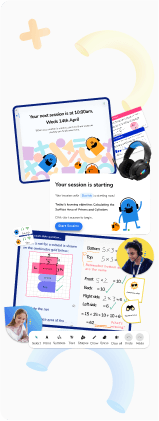
For secondary schools:
Year 7 catch up or GCSE revision lessons
DBS-checked online maths tutor with tutoring experience
Diagnostic assessments to diagnose learning gaps from KS2-4
Focus on plugging gaps & exam technique
Regular reports
Additional GCSE revision resources
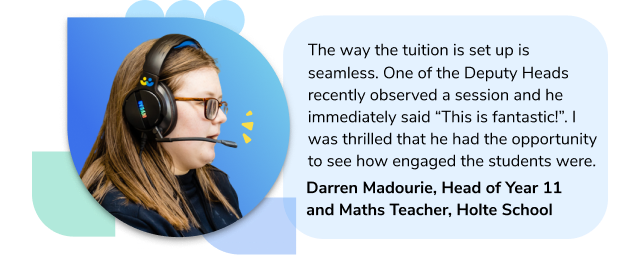
Money-back guarantee
We’re so confident your staff and students will love it that we’ll give you 100% of your money back if you’re not happy within the first 6 weeks.
Request a tutoring quote for your school
Trusted by 4,000+ school leaders across the UK to provide cost-effective one to one maths tutoring for the pupils who need it most:
56% cheaper than the average cost of online one to one tutoring
The UK’s most affordable DfE-approved tutoring partner
Includes free headsets, diagnostic assessments and regular reports
Discounts available for long-term bookings and MATs
You can learn more about how we keep your data safe and secure in our privacy policy.
Frequently asked questions
How much does maths tuition cost in the UK?
Private maths tutors charge on average £28 per hour, and even more in large cities such as London and Birmingham where you’ll often be spending over £30 per hour. The price tutors charge additionally depends on the years of experience tutoring they have, their qualifications (i.e. Are they a qualified maths teacher? Do they have a DBS, PGCE or QTS?) and the materials they will use. In-person tutoring typically costs more than online tutoring as online maths tutors save money on overhead costs, including travel. The EEF has found that online tutoring is just as effective as face to face tutoring, so it can be an economical and effective option to go online. Schools can additionally use National Tutoring funding to help cover up to 50% of the cost of tutoring in 23/24, up to a maximum of £18 per pupil per hour. Third Space Learning is the most DfE-approved one to one tuition provider.
Is maths tuition worth it?
Yes, high quality maths tuition is worth it. It is one of the best evidenced interventions to support learning in any subject, however it can be challenging to get it right. Maths in particular is a subject that lends itself to tutoring. This is because maths is cumulative, i.e. concepts build on one another. This is in contrast to subjects such as English and often why subjects such as maths and physics are considered to be so difficult. It means that students need to have a strong understanding of foundational concepts before they are able to progress. If students have gaps in their learning, they’ll struggle to keep up with their peers. High quality maths tuition will identify those gaps and address them early, so that students can catch up and keep up with their classmates. One of the main benefits of maths tuition is this opportunity for personalised teaching adapted to a child’s needs. This is why one to one maths tuition is more effective than small group tuition – children aren’t working through generic programmes or worksheets and are focusing on the areas that will have the most impact. Going online can help reduce the costs typically associated with one to one tuition, without reducing impact.
What is the best age for tutoring?
Schools often prioritise their exam years (e.g. SATs, iGCSE, GCSE and A-level Maths) for tutoring. This is why we at Third Space Learning have developed targeted tutoring programmes for SATs and GCSE Maths. These can give students the extra boost and individualised attention they need before their exams. However it can be beneficial to start early, closing learning gaps early before they widen. In our primary programme, we identify and plug gaps as far back as KS1 to give pupils the best chance of progress in maths. Similarly for our Year 7 programme, we ensure students have a strong foundation in content from Years 5 & 6 before moving into Year 7 content.
What does a maths tutor do?
A good maths tutor will conduct a diagnostic assessment before they begin tutoring sessions to understand a students’ working level in maths. In our own diagnostic assessment, we additionally identify learning gaps and misconceptions. We find this helps to propel progress further and faster. Next, a maths tutor will need to understand the goals for the learner – at GCSE, a pupil aiming for a grade 4 in maths will need a different approach to a student aiming for a grade 9 in further maths. At primary school, a main goal may be to increase confidence in maths or even to develop a strong foundation in their times tables to allow them to access other areas of the curriculum in maths. Using this information, a maths tutor will develop a sequence of sessions to help pupils progress. These should be tailored and adapted to the individual, but not all tutors provide this so ensure to ask about this: What curriculum do they use? How do tutors tailor lessons to pupils? Are they familiar with different exam boards (AQA, Edexcel)? Maths tutors will then teach the sessions, whether online or in person, providing live feedback to pupils. Throughout, the tutor should conduct assessment to measure pupils’ progress and understanding and adapt accordingly. This may be informally in sessions or through written assessments.